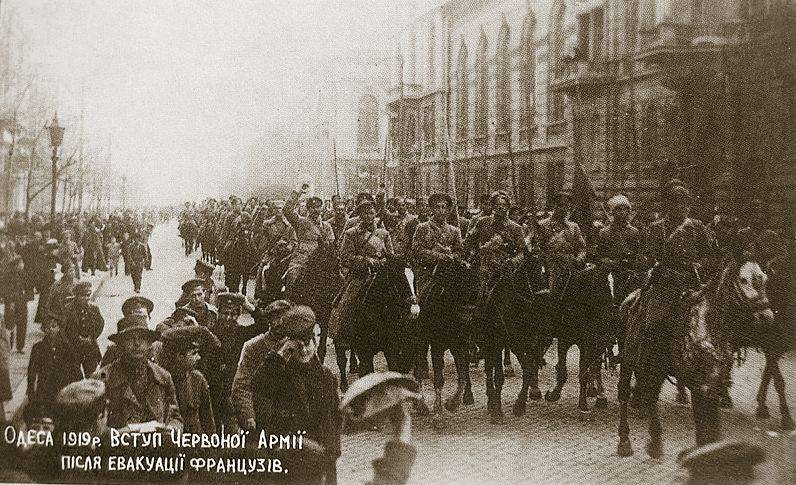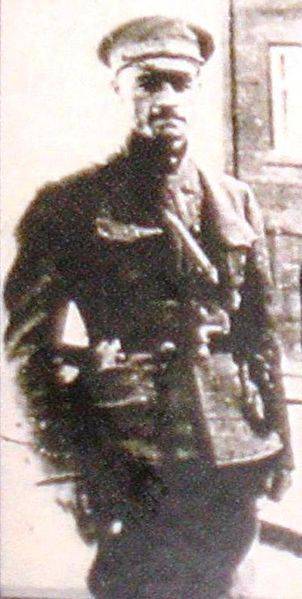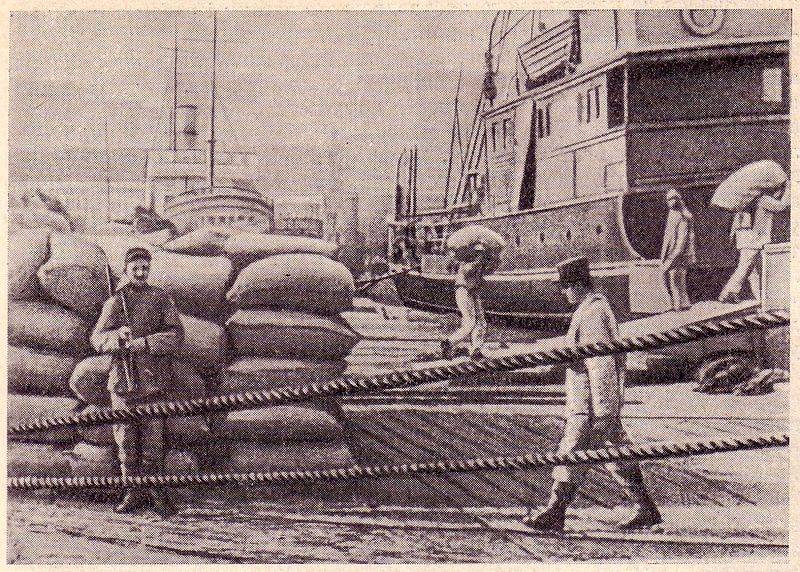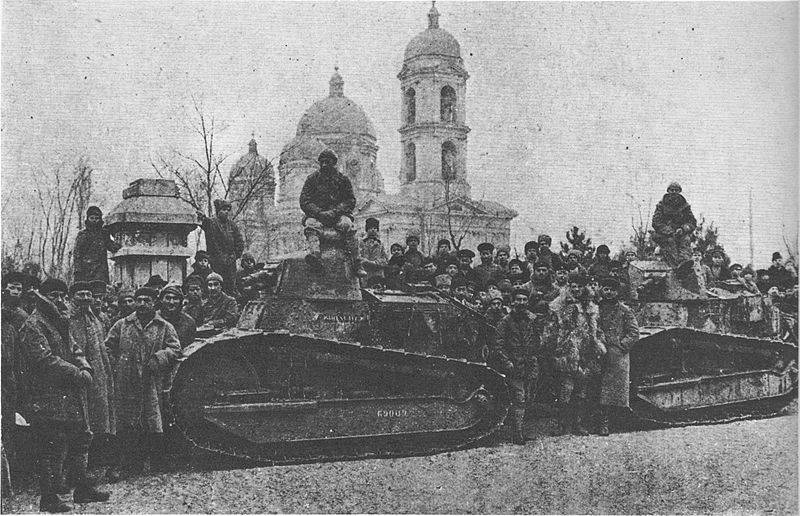Nikifor Grigoriev, "ataman of the rebel forces of Kherson region, Zaporizhia and Tavria"

Soldier Grigoriev
Nikifor Aleksandrovich Grigoriev was born in the Podolsk province, in the town of Dunaevets, in 1885. The real name of the future "head ataman" was Servetnik, he changed it to Grigoriev when the family moved from Podillia to the neighboring Kherson province in the beginning of the century, to the village of Grigorievka.
He graduated from only two classes of elementary school (the lack of education will remind of himself in the future), he studied as a paramedic in Nikolaev. As a volunteer, as a volunteer, he participated in the Japanese campaign. He proved himself in battle, becoming a brave and experienced fighter. Promoted to non-commissioned officer. After the war, he studied at the Chuguev Infantry Cadet School, which he graduated in 1909. Sent to the 60th Zamosc Infantry Regiment in Odessa with the rank of ensign.

However, in a peaceful life, his seething energy did not find an outlet. Grigoriev retired, served as a simple excise official, and according to other information - in the police in the district town of Alexandria. With the outbreak of war with the Central Powers, he was mobilized into the army, fought as an ensign on the Southwestern Front. He again proved himself as an experienced and courageous soldier, was awarded the St. George Cross for bravery and rose to the rank of staff captain.
After February, Grigoriev headed the training team of the 35th regiment, located in Feodosia, from the autumn of 1917 he served in the Berdichev garrison. Became a member of the Soldiers' Committee of the Southwestern Front. The soldiers liked him for his recklessness, simplicity of relationships with lower ranks (including drinking). Among the personal qualities of Nikifor, those who knew distinguished: personal courage (he convinced the rank and file to go into battle, setting an example for them), military talent and cruelty (he knew how to keep his subordinates in obedience), talkativeness and boastfulness, and at the same time ambition and secrecy. His dense ignorance and zoological anti-Semitism (hatred of Jews), characteristic of Little Russian peasants, and a penchant for drunkenness were noted.
How Grigoriev became "involved in politics"
The turmoil allowed Grigoriev to turn around, "to engage in politics." Having visited the congress of front-line soldiers and having fallen under the influence of S. Petlyura, Grigoriev decided that the “finest hour” was Ukrainization. He began to actively engage in the Ukrainization of the army, supported the Central Rada. From volunteers, Grigoriev forms a shock Ukrainian regiment and receives the rank of lieutenant colonel. Petlyura instructed Grigoriev to create Ukrainian units in the Elizavetgrad district.
Grigoriev supported Hetman Skoropadsky, and for his loyalty to the new regime he received the rank of colonel and became the commander of one of the units of the Zaporozhye division. The Troubles allowed such adventurers as Grigoriev to make the most dizzying career, to become part of the military-political elite. Within a few months, Grigoriev revised his priorities and changed his political color. He goes over to the side of the rebellious peasants, who began to oppose the systematic robberies of the Austro-German invaders and the hetman detachments, which returned the land to the landowners.
The young colonel establishes contact with the opposition "Ukrainian National Union" and Petlyura, participates in the preparation of a new coup d'état in Little Russia. Grigoriev organizes detachments of peasant rebels in the Elizavetgrad region to fight the Austro-German troops and the Hetman's police (varta). The first rebel detachment, numbering about 200 people, Grigoriev gathered in the villages of Verblyuzhki and Tsibulevo. He proved to be a lucky leader. The rebels captured the Austrian military train at the Kutsivka station, capturing rich trophies, which made it possible to arm 1,5 thousand people. This and other successful operations created the image of a successful leader-ataman in the eyes of the rebels of the Kherson region. He became the chief ataman of the north of the Kherson region. By the autumn of 1918, under the command of Grigoriev, there were up to 120 detachments and groups with a total number of about 6 thousand people.
"Ataman of the rebel forces of Kherson region, Zaporozhye and Tavria"
In mid-November 1918, in connection with the defeat of the German bloc in the war (the Skoropadsky regime was sitting on German bayonets), a powerful uprising broke out in the center of Little Russia, led by members of the Directory Vinnichenko and Petliura. A few weeks later, the Petliurists already controlled most of Little Russia and laid siege to Kyiv. On December 14, 1918, Skoropadsky signed the abdication manifesto and fled with the Germans.
Meanwhile, the Grigoryevites drove the Germans and Hetmans out of the village of Verblyuzhki and Alexandria. Grigoriev proclaimed himself "Ataman of the rebel troops of Kherson, Zaporozhye and Tavria". True, it was a boast. He then controlled only one district of the Kherson region, and never appeared in Zaporozhye and Tavria. In Zaporozhye, Makhno was the master. In December 1919, the Grigoryevites invaded the Northern Black Sea region, defeated the combined detachments of the hetmans, Germans and white volunteers. On December 13, after an agreement with the German command, the ataman occupied Nikolaev. In Nikolaev at that time there were several authorities - the city council, the ataman and the commissioner of the UNR. Grigoriev made the city his "capital" and soon occupied a large territory of Novorossia with his gangs. Grigoryevtsy captured huge booty. Formally, the ataman acted on behalf of the UNR Directory. Under his command was the Kherson division - about 6 thousand soldiers (4 infantry and 1 cavalry regiments).
For a short period of time, Grigoriev felt himself the sole owner of a vast area with the cities of Nikolaev, Kherson, Ochakov, Apostolovo and Alyoshki. Formally, the Kherson-Nikolaev region was part of the UNR, but the real ruler-dictator there was Grigoriev. Pan ataman felt like a "major political figure" and began to speak with Kiev in the language of ultimatums. He demanded from the Directory the post of Minister of War. The Directory could not fight with the ataman, therefore, in order to "calm" him, they gave him the post of commissioner of the Alexandria district. Grigoriev, on the other hand, continued to quarrel with the Kyiv government, showed independence, and clashed with the neighboring Petliura division of Colonel Samokish and the army of Father Makhno. Formally remaining on the "right" positions, the ataman conspires with the "left" - the party of Ukrainian Socialist-Revolutionaries-Borotbists, who were at enmity with Petliura and sympathized with the Bolsheviks. At the same time, Grigoriev openly declared that “communists must be cut!”
Grigoriev could not become the sovereign master of the Northern Black Sea region. At the end of November 1919, Entente troops (Serbs, Greeks, Poles) began to arrive in Odessa, where there was still a strong garrison of Austro-German troops. In December, a French division arrived in Odessa. At this time, the troops of the Directory and the rebels occupied almost the entire Black Sea region and on December 12 entered Odessa. The Allies at first controlled only a small seaside "Union zone" of Odessa (port, several seaside quarters, Nikolaevsky Boulevard). On December 16, the French, Poles and the White Guards of Grishin-Almazov ousted the Petliurists from Odessa. On December 18, the allied command demanded that the Directory withdraw its troops from the Odessa region. Petliura, fearing a war with the Entente and desiring an alliance with the Western powers, ordered the withdrawal of the troops of the Southern Front of the UNR army under the command of General Grekov. Later, at the request of the allied command, the Petliurists liberated a large bridgehead for the French troops, sufficient to supply the population of Odessa and the Entente grouping.
Grigoriev, not wanting to endure rivals at his side, demanded that Petliura stop negotiations with the allies and resume the struggle for the Black Sea region. In order to negotiate with the rebellious ataman, in January 1919 Petlyura arrived to meet him at Razdelnaya station. The cunning chieftain demonstrated complete loyalty to Petliura. Although he had already decided to go over to the side of the Bolsheviks and in two weeks he would change the Directory.
Odessa Mama
Odessa, the main Russian trading port in the South of Russia, was of key importance in the Northern Black Sea region at that time. It was the main center of grain exports and at the same time the center of smuggling coming from the Balkans and Turkey. This city was a major center of crime already before World War II, and in 1918 it became a real all-Russian "raspberry". The Russian customs disappeared, and the Austrian, and then the French occupation authorities turned a blind eye to many things and easily bought. As a result, life in Odessa at that time resembled a tragicomic carnival.
There were many refugees in Odessa, the city was the second all-Russian center of flight after Kyiv. After the uprising of the Petliurists and the offensive of the Red Army in Little Russia, a huge stream, with the addition of refugees from Kharkov, Kyiv and other cities, poured into coastal Odessa. They hoped for the protection of the Entente. A large mass of refugees has become an excellent nutrient "broth" for the local underworld and thieves, bandits from all over Little Russia.
The allies, despite their apparent power, turned out to be empty. Politicians and the military could not decide what they were doing in Russia. They constantly hesitated, promised a lot, and immediately forgot about their words. One thing was for sure - they did not want to fight. And they prevented the Whites, who were ready, under the cover of the Entente, to form powerful formations and launch an offensive. The French were negotiating with the Directory and did not want to aggravate the situation. Relations with Denikin did not work out, he was too independent and did not see the French as masters. Therefore, the French troops were in complete inactivity and decomposed. The soldiers, after the fronts of the world war, came to Russia as if on a picnic, lounging, eating, drinking, engaged in various speculations. As a result, they decomposed worse than the Russian units after the February Revolution of 1917. And they could not fight even with the gangs of Grigoriev.
In this case, the French did not allow to create a strong army and the White Guards to close their bayonets. General Timanovsky, Markov's aide, a brave and skillful commander, arrived in Odessa from Denikin’s army. Here at the base of numerous refugees, under the cover of the Allies, in the presence of huge warehouses weapons and military property of the old Russian army in Tiraspol, Nikolaev and the island of Berezan near Ochakov, there were excellent opportunities for the formation of white units. But the French did not allow this to be done. They banned mobilization in the Odessa region and proposed the idea of “mixed brigades”, where officers are selected from natives of Ukraine, privates are volunteers, units are controlled by French instructors, and they are subordinate only to the French command. Denikin opposed such a plan. It is clear that such "mixed" parts could not be created. The French also refused to transfer the property of the former tsarist army to the Volunteer Army, citing the fact that the warehouses belong to the Directory. The French, possessing huge reserves, did nothing to help Denikin's army. Moreover, even Timanovsky's volunteer brigade, the only combat-ready unit of the Whites, which was formed and which was operationally subordinate to the French, was supplied by sea from Novorossiysk.
During the expansion of the zone of French occupation in the winter of 1919 to Kherson and Nikolaev, the commander of the Entente forces in the South of Russia, General d'Anselm, forbade the introduction of a white administration outside of Odessa. As a result, several authorities acted simultaneously in the zone of occupation, which aggravated the general confusion. So, in Nikolaev there were five authorities at once: the pro-Soviet city Duma, the commissar of the Directory, the Council of Workers' Deputies, the Council of Deputies of the German garrison (thousands of German soldiers did not evacuate, remaining in the city) and the French. In Odessa itself, in addition to the French and the white military governor Grishin-Almazov, there was also an unofficial government - bandits. In Odessa, even before the war, there was a strong crime, while with national groups. The turmoil further aggravated the situation - the complete collapse of the law enforcement system, the mass of the unemployed, the poor, former soldiers, accustomed to death, weapons. New criminals fled here from places where they were crushed - from Soviet Russia, where a new statehood and law enforcement system were gradually taking shape. Smuggling became legal, and banditry seemed easy and profitable. The king of the local mafia was Mishka Yaponchik, who had a whole army under him, thousands of fighters.
Meanwhile, while the French were inactive and interfered with the actions of the Whites, while Odessa lived in vanity, speculation and machinations, the external situation was getting worse for the interventionists. The Red Army quickly occupied Little Russia, Petliurism finally degenerated, the troops of the Directory went over to the side of the Reds or turned into outright bandits. By February 1919, the Red Army was concentrated on the front from Luhansk to Yekaterinoslav, aiming at Rostov-on-Don, Donbass, Tavria and Crimea. In Odessa, carefree life, fun, rampant criminality, enrichment and political intrigues continued. Not surprisingly, the interventionists quickly surrendered Odessa, almost without a fight. All the huge power of the Entente in Odessa - 2 French, 2 Greek, 1 Romanian divisions (35 thousand soldiers), a large number of artillery, fleet, turned out to be a soap bubble that burst at the first threat.


Tanks Renault with French tankmen, locals and volunteers in Odessa. Source: https://ru.wikipedia.org
To be continued ...
- Alexander Samsonov
- Smoot. 1919 year
How the British created the Armed Forces of the South of Russia
How to restore Soviet power in Ukraine
How Petliurists led Little Russia to a complete catastrophe
How defeated Petliurism
Give the boundaries of 1772 of the year!
Battle for the North Caucasus. How to suppress the Terek Uprising
Battle for the North Caucasus. CH 2. December battle
Battle for the North Caucasus. CH 3. The January accident of the 11 Army
Battle for the North Caucasus. CH 4. How the 11 army died
Battle for the North Caucasus. CH 5. Capture of Kizlyar and the Terrible
Battle for the North Caucasus. CH 6. Furious assault of Vladikavkaz
How Georgia tried to seize Sochi
How the Whites crushed the Georgian invaders
The war of February and October as a confrontation between two civilization projects
How did the "Flight to the Volga"
How Kolchak's army broke through to the Volga
Catastrophe of the Don Cossacks
Verkhniyon uprising
How "Great Finland" planned to seize Petrograd
"All to fight with Kolchak!"
Frunze. Red Napoleon
The missed opportunities of the army of Kolchak
May offensive of the Northern Corps
How white broke through to Petrograd
Battle for the South of Russia
Strategic change on the southern front. Manych operation
Crimea on fire Russian distemper
Crimea in 1918-1919. Intervents, local authorities and whites
How did the uprising of ataman Grigoriev
Information